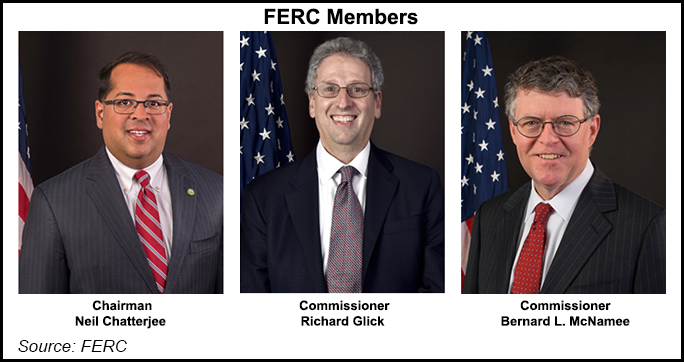Regulatory | NGI All News Access | NGI The Weekly Gas Market Report
FERC Remains Independent, Nonpartisan Agency, Says Chatterjee
FERC remains an independent agency and makes decisions in a bipartisan manner, despite only three of its five seats being filled and published reports to the contrary, according to Chairman Neil Chatterjee.

Reports of a partisan divide at the Federal Energy Regulatory Commission, which has seen its traditional five-member panel trimmed to three in recent weeks, aren’t accurate, Chatterjee said Thursday.
“It’s unfortunate, I think, that there’s sense of politicization at the agency,” he said in a conversation hosted by the non-profit Resources for the Future in Washington, DC.
Beginning last October, when health issues forced former Chairman Kevin McIntyre to step away from the chairmanship, and until former Chairman Cheryl LaFleur left FERC last month, votes on “every single order” were bipartisan, Chatterjee said.
“I’m confident that we can continue to do our work and I don’t think folks should read into 2-1 votes as being inherently some kind of politicization of the agency. I do think, as you can see from the separate statements that have been issued by my colleagues, there are some real differences in interpretation of the law by my colleagues, and I do expect some of those differences to play out…
“For me, the ultimate arbiter of our work will be the courts, and whether our orders are legally durable or not.”
Chatterjee, who was nominated to FERC by President Trump in May 2017, said his approach to bipartisanship came about while working as an energy policy adviser to Senate Majority Leader Mitch McConnell (R-KY).
“I saw how Sen. McConnell worked to bridge the interests of Kentuckians with a diverse array of folks within his own conference in the Senate as well as across the Senate. Ultimately a number of these deals were cut while President Obama was in the White House, and so we had to ensure legislation could clear both chambers and be signed by the president. I think that experience prepared me well for my role at the Commission.
“However, that said, I have a keen understanding that I have a different job today, and serving at an independent regulatory agency where its incumbent that we view issues in a nonpartisan, fuel-neutral, technical way…I’ll be the first to admit, as with any transition into a job, it took me a while to transition from partisan legislative aide to independent regulator.”
The first example of that, Chatterjee said, was the Department of Energy’s (DOE) controversial notice of proposed rulemaking (NOPR) in September 2017, only weeks after his confirmation to FERC. The Commission eventually rejected the NOPR by a 5-0 vote, and issued a separate order “to holistically examine the resilience of the bulk power system.”
“Here I am, I’m a Kentuckian who worked on these policy issues for Sen. McConnell, and initially, instinctively, one’s natural inclination is, ‘I want to do something to help the people that I care about.’ But in making that transition to independent regulator, I take very seriously that in this new role we have to abide by the record before us and by the evidence, and as difficult as it was for me to swallow personally that I could not do something to help the communities that I care about, at the end of the day, the record that was before us in that proceeding did not justify the action that DOE was asking us to take.”
That said, the nation’s energy policy must be steered by elected officials in Congress, Chatterjee said.
“I’m a big believer in the legislative branch and in Congress’s role in setting the direction for policy. Look how it worked on the Energy Policy Act of 2005. It’s really the last significant piece of federal energy legislation that was passed by the Congress and signed into law. Since then, almost every energy policy legislative action has come in the form of a rider to an omnibus appropriations bill, or in the tax code.
“The result of that is suddenly some of the pivotal decisions about our energy future are falling to agencies like the FERC, where we’re constrained by the statutes that govern us. We don’t have the tools that congress has to make these critical policy decisions.”
The White House has given no indication of whom President Trump might nominate to replace McIntyre or LaFleur. By law, no more than three seats at FERC may be held by one political party.
Among the names floated as possible nominees have been Barry Smitherman, former Railroad Commission of Texas chairman and Texas Public Utilities Commission member; Allison Clements, a former senior attorney at the Natural Resources Defense Council; Patrick McCormick, former chief counsel for the Senate Energy and Natural Resources Committee; and Ellen Nowak, former chairwoman of the Wisconsin Public Service Commission. Also reportedly under consideration is David Hill, former general counsel for NRG Energy, and James Danly, who was named FERC general counsel in 2017.
© 2024 Natural Gas Intelligence. All rights reserved.
ISSN © 1532-1231 | ISSN © 2577-9877 | ISSN © 1532-1266 |
